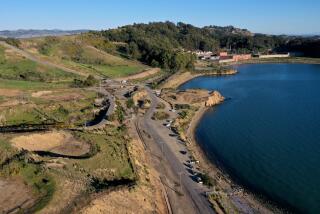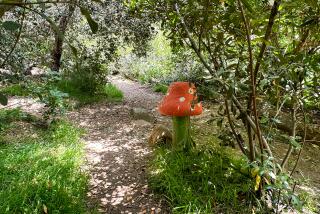Width of a Road Pits Synod Against Environmentalists
At odds over the future of a Pacific Palisades park, environmentalists and a synod of the Presbyterian Church have locked horns in a dispute that may now be left for the courts to decide.
The Synod of Southern California and Hawaii has filed a lawsuit in a bid to force a state agency to build a 48-foot-wide road into Temescal Gateway Park. Opponents say the plan would ruin the 20-acre park, which is a favorite of hikers.
“That kind of road in a park as small as this one is ludicrous,” said Carole Stevens, chairwoman of the Santa Monica Mountains Conservancy, which would be required to build the road.
The lawsuit, filed last month in Los Angeles Superior Court, also names the state of California and the Los Angeles Unified School District. The school district acquired the property from the synod by condemnation in 1968 to build a school there, but later sold it to the conservancy after plans for the school were scrapped.
In the lawsuit, the synod claims that it was given assurances by the school district that a road would be built on the property that the synod could share, and that the conservancy inherited the obligation to build the road as a condition of its purchase.
The park, which is next to synod property at Sunset Boulevard and Temescal Canyon Road, is one of the most accessible links to the extensive trail system in the Santa Monica Mountains.
Each month, about 750 hikers use the trail, which originates in the park, but twists along an easement on synod property for almost a mile before linking up with a trail in Topanga State Park and a network of public hiking trails beyond.
“Preserving the integrity of the park is of utmost concern to us,” said John Diaz, a planner with the conservancy. “Where else can you step off a street bus and be at a trail head?”
The synod’s opponents have accused church officials of wanting to sacrifice the park for the sake of a new Presbyterian Conference Center that the synod has long wanted to build and that would be served by the proposed road.
The road would run for a quarter of a mile along the park boundary that abuts the synod property, starting at Sunset Boulevard.
Church officials declined comment on the dispute, referring inquiries to an attorney.
“The synod has taken the action that it has in order to get the road it feels it is entitled to have,” said Bill White, a lawyer for the synod.
White said the synod had “gone to great lengths” to negotiate a compromise with the conservancy and the neighbors over the road and the size of the proposed conference center. He said the lawsuit was filed as an act of “self-protection” because of the conservancy’s plans for a 28-foot-wide roadway into the park, which synod officials say is inadequate to help serve the size of the conference center they have in mind.
The synod, which represents about 300 churches, has for many years operated a conference center in several old buildings capable of accommodating 135 guests. Some of the Palisades’ first permanent structures, a meat market and grocery store built in the 1920s, now serve as the center’s office and cafeteria.
For years, church officials have talked of building a new center to accommodate up to 500 guests and a staff of between 10 and 15 people. But in January, in an apparent bid to mollify neighbors long opposed to the plan, church officials voted to reduce the size of the project by half.
Neighbors have often criticized the synod’s plan, saying it resembles a major hotel development more than a church retreat. Although encouraged by the reduced size, neighbors have made it clear they prefer there be no expansion.
“They can’t build the kind of center they want without a wider road to satisfy fire-safety requirements and that sort of thing, and I think that helps to explain why the lawsuit was filed,” said Frances Shalant, a member of the Pacific Palisades Residents Assn.
Officials of her group and two other community groups expressed surprise at the timing of the lawsuit, saying that private talks between the neighbors and church officials had been going well.
“It was shocking the way they did it,” said Diane August, chairwoman of Friends of Temescal. “We would like to see them upgrade their property and keep it rustic and attractive without expanding, and we thought we were headed in that direction until (the lawsuit) occurred.”
But White, the synod attorney, said the synod is eager to make peace with its neighbors, despite the lawsuit.
“The synod is interested in protecting its rights (for a road), and has shown itself to be environmentally sensitive in the past,” he said. “It doesn’t feel there is anything in what it wants to do that would damage the integrity of the park.”
More to Read
Sign up for Essential California
The most important California stories and recommendations in your inbox every morning.
You may occasionally receive promotional content from the Los Angeles Times.









